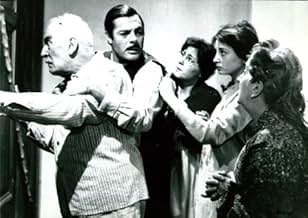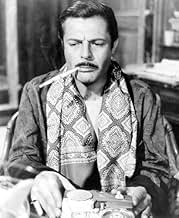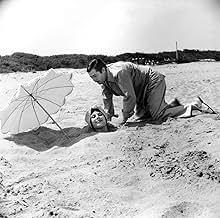NOTE IMDb
7,9/10
15 k
MA NOTE
Un baron sicilien marié tombe amoureux de sa cousine et se jure de l'épouser, mais le divorce étant illégal, il doit élaborer un crime passionnel pour en finir avec sa femme.Un baron sicilien marié tombe amoureux de sa cousine et se jure de l'épouser, mais le divorce étant illégal, il doit élaborer un crime passionnel pour en finir avec sa femme.Un baron sicilien marié tombe amoureux de sa cousine et se jure de l'épouser, mais le divorce étant illégal, il doit élaborer un crime passionnel pour en finir avec sa femme.
- Réalisation
- Scénario
- Casting principal
- Récompensé par 1 Oscar
- 12 victoires et 9 nominations au total
Avis à la une
Definitely a classic film, but not just an Italian classic! "Divorzio all'italiana" centers itself around Ferdinando Cefalù (Mastroianni), a 37 year old baron in a small town. Although he's a baron, his life is not completely perfect as his father has squandered much of their money, and his extremely clingy wife Rosalia stands between him and the only thing he loves, his 16 year old cousin Angela. To add salt to the wound, 1960's Italy does not allow couples to divorce, which leads Ferdinando to seek desperate measures. After a town scandal erupts, when a woman murders her cheating husband to protect her honor, Ferdinando is inspired to set up his wife with a lover in order to kill her and "protect his honor." The rest of the movie chronicles Ferdinando's attempts to find someone who would fit the bill.
"Divorzio all'italiana" is a satirical look at Italian society and its seemingly backward laws which force people to do stupid things and its fallibility at justice. In its social commentary of Italian laws/society, Concini, Germi, and Giannetti (the writers) create well fitted, stereotypical characters that are much needed in order for the message of the film to get across. Ferdinando plays the evil nobleman, Rosalia as the annoying wife, Angela as the desirable secret teen lover, etc. The beauty of the story not only lies in it's scathingly funny humor, with Ferdinando's clever plotting and hallucinations of killing his wife, but also in its ability to transcend time. Nowadays there are no laws that forbid divorce in most societies, but even though that crucial point does not relate to modern audiences, the film is still able to conjure emotions for the characters' plight. Another great thing about the film, is the idea of a protagonist character with typically antagonist characteristics. Ferdinando is definitely a bad man, but the story plays with the audience in making them want Ferdinando to succeed in his plot. To add to the underlying theme of the film, the failure of Italian laws, is the theme of "justice" whether it be from the law or from a simple reversal of fate. Definitely watch the film up to the very end, as it closes with an ironic yet justified twist of fate for the characters involved.
"Divorzio all'italiana" is a satirical look at Italian society and its seemingly backward laws which force people to do stupid things and its fallibility at justice. In its social commentary of Italian laws/society, Concini, Germi, and Giannetti (the writers) create well fitted, stereotypical characters that are much needed in order for the message of the film to get across. Ferdinando plays the evil nobleman, Rosalia as the annoying wife, Angela as the desirable secret teen lover, etc. The beauty of the story not only lies in it's scathingly funny humor, with Ferdinando's clever plotting and hallucinations of killing his wife, but also in its ability to transcend time. Nowadays there are no laws that forbid divorce in most societies, but even though that crucial point does not relate to modern audiences, the film is still able to conjure emotions for the characters' plight. Another great thing about the film, is the idea of a protagonist character with typically antagonist characteristics. Ferdinando is definitely a bad man, but the story plays with the audience in making them want Ferdinando to succeed in his plot. To add to the underlying theme of the film, the failure of Italian laws, is the theme of "justice" whether it be from the law or from a simple reversal of fate. Definitely watch the film up to the very end, as it closes with an ironic yet justified twist of fate for the characters involved.
There's a moment in Pietro Germi's Divorzio all'italiana (aka: Divorce Italian Style) that pretty much defines everything, that sort of defines what a black comedy is all about: a certain woman murders her husband because he had run away with another woman, that certain woman murdered him while he was out with his new love. And that certain woman had something similar with our main character, Marcello Mastroianni's Baron Ferdinando Cefalù, and actually after the murder she crossed path with Ferdinando. The moment that sort of defines everything is when these two, the certain woman and our main character, are together since is Mastroianni delivering a really great laugh, is Ferninando being like "" ...certainly and certainly is the way that Mastroianni delivers the scene that makes it so fantastic and hilarious.
10Denis M
This is definitely one of the best Italian comedies ever made, a movie you can watch over and over again... Mastroianni gives an excellent performance as an impoverished Sicilian aristocrat determined to get a divorce from his wife. There is only one complication - divorce is illegal in Italy at the time. However, there is also a law that justifies the killing of a wife if she is caught during an act of adultery. As with most others Germi's films, this one is a unique mix of situational comedy and social drama. Highly recommended.
When I first saw Pietro Germi's movies (a long time ago), I thought he was a misogynist who portrayed women as grotesque monsters that make men's lives miserable. Thirty years later, after the women's movement, I have come around 180 degrees, and see him as a feminist before his time--showing how the patriarchal family destroys women (and men)and exposing the absurdity of "family honor"--and doing it with humor. It doesn't just apply to Sicily. The Sicilian setting and ambiance is a big part of this movie, however--watch for all the little details of gestures and interactions, and the great shots of the sunbaked town, baroque churches, and interiors of the decaying houses of the aristocrats. Mastroianni is terrific, and so is the supporting cast.
(Note: Over 500 of my movie reviews are now available in my book "Cut to the Chaise Lounge or I Can't Believe I Swallowed the Remote!" Get it at Amazon.)
Divorzio all'italiana is a richly textured satire of Sicilian macho Catholic life styles starring one of Italy's greatest actors, Marcello Mastroianni. He is a bit Chaplinesque in this tongue in cheek exploration of how to dump your wife and marry your 16-year-old cousin. His wide-eyed, dead pan expressions combined with vulnerability and suave, leading-man good looks made him the heart-throb of women for decades. He plays a bored baron stuck with a baroness (played fatuously by Daniela Rocca) that he cannot abide. It should be noted that today it IS possible to get a divorce in Italy, but at the time it was very difficult, perhaps easier to get an annulment, and so we have the premise of the plot.
Stefania Sandrelli, who became one of the great ladies of the Italian cinema, plays the cousin. She was only 15 when the film was shot but could easily pass for, say, 18. She is sensual, sweet and a bit naughty. In the final scene, famous for its fitting irony, the last thing we see are her feet. I won't tell you more, but the movie is almost worth seeing just for that final scene.
Rocca's Rosalia on the other hand is more syrupy than sweet and would qualify as clinging. She could smother a lumberjack, and although it is not polite to comment unfavorably on a lady's looks, I must note that she seemed to be having a bad facial hair day, everyday. Her impersonation of a country baroness nonetheless was unforgettable. I also liked 16-year-old Margherita Girelli as Sisini, the maid. Her coquettish ways helped to lend a French bedroom farce flavor to the film.
But what really makes this one of the great monuments of the Italian cinema is the witty and delightful script by Ennio De Concini (it won an Academy Award in 1962) and the detailed, textured direction by Pietro Germi. The picture that Germi paints of life in a small Sicilian (or southern Italian, for that matter) village is picturesque, much imitated, and indelible. The crowded ornate clutter of the old estate, the sun-drenched streets and the monolithic stone and mason churches haunt our memory. True, the film starts a bit slowly and drags (at least for modern audiences) a bit at times, but don't make the mistake of giving up on this. The latter half of the film is wonderful. And remember, if you had to go to film school, Divorce Italian Style would be on the syllabus.
So see this for Mastroianni of course but also because no film education would be complete without having seen Divorzio all'italiana.
The Criterion Collection DVD includes a second disc with a documentary on Germi's career, an interview with Ennio De Concini, and screen-test footage of Stefania Sandrelli and Daniela Rocca that I just had to see. There is also a booklet with reviews of the film from Stuart Klawans, Andrew Sarris, and Martin Scorsese. Scorsese's review is adoring and nostalgic since he is from Sicily and since the film had made such a lasting impression on him as a 19-year-old. For him the film was not so much a comedy as a true reflection of a life he and his family had known. He writes, "Every detail in Divorce Italian Style is so truthful and right that all Germi had to do was heighten everything a bit to make it funny."
Divorzio all'italiana is a richly textured satire of Sicilian macho Catholic life styles starring one of Italy's greatest actors, Marcello Mastroianni. He is a bit Chaplinesque in this tongue in cheek exploration of how to dump your wife and marry your 16-year-old cousin. His wide-eyed, dead pan expressions combined with vulnerability and suave, leading-man good looks made him the heart-throb of women for decades. He plays a bored baron stuck with a baroness (played fatuously by Daniela Rocca) that he cannot abide. It should be noted that today it IS possible to get a divorce in Italy, but at the time it was very difficult, perhaps easier to get an annulment, and so we have the premise of the plot.
Stefania Sandrelli, who became one of the great ladies of the Italian cinema, plays the cousin. She was only 15 when the film was shot but could easily pass for, say, 18. She is sensual, sweet and a bit naughty. In the final scene, famous for its fitting irony, the last thing we see are her feet. I won't tell you more, but the movie is almost worth seeing just for that final scene.
Rocca's Rosalia on the other hand is more syrupy than sweet and would qualify as clinging. She could smother a lumberjack, and although it is not polite to comment unfavorably on a lady's looks, I must note that she seemed to be having a bad facial hair day, everyday. Her impersonation of a country baroness nonetheless was unforgettable. I also liked 16-year-old Margherita Girelli as Sisini, the maid. Her coquettish ways helped to lend a French bedroom farce flavor to the film.
But what really makes this one of the great monuments of the Italian cinema is the witty and delightful script by Ennio De Concini (it won an Academy Award in 1962) and the detailed, textured direction by Pietro Germi. The picture that Germi paints of life in a small Sicilian (or southern Italian, for that matter) village is picturesque, much imitated, and indelible. The crowded ornate clutter of the old estate, the sun-drenched streets and the monolithic stone and mason churches haunt our memory. True, the film starts a bit slowly and drags (at least for modern audiences) a bit at times, but don't make the mistake of giving up on this. The latter half of the film is wonderful. And remember, if you had to go to film school, Divorce Italian Style would be on the syllabus.
So see this for Mastroianni of course but also because no film education would be complete without having seen Divorzio all'italiana.
The Criterion Collection DVD includes a second disc with a documentary on Germi's career, an interview with Ennio De Concini, and screen-test footage of Stefania Sandrelli and Daniela Rocca that I just had to see. There is also a booklet with reviews of the film from Stuart Klawans, Andrew Sarris, and Martin Scorsese. Scorsese's review is adoring and nostalgic since he is from Sicily and since the film had made such a lasting impression on him as a 19-year-old. For him the film was not so much a comedy as a true reflection of a life he and his family had known. He writes, "Every detail in Divorce Italian Style is so truthful and right that all Germi had to do was heighten everything a bit to make it funny."
Le saviez-vous
- AnecdotesThe "honor killing" law, which provided mitigating circumstances for anyone who killed his "spouse, daughter or sister" (or their lover) upon discovering them "in illegitimate carnal relations", was definitely abrogated in Italy in 1981, exactly 20 years after the release of this movie.
- GaffesWhen Ferdinando gets in bed with Rosalia after their fight, Rosalia's head facings change significantly between shots.
- Citations
Ferdinando Cefalù: Have you really got another headache?
- ConnexionsEdited into Lo schermo a tre punte (1995)
Meilleurs choix
Connectez-vous pour évaluer et suivre la liste de favoris afin de recevoir des recommandations personnalisées
- How long is Divorce Italian Style?Alimenté par Alexa
Détails
- Date de sortie
- Pays d’origine
- Langue
- Aussi connu sous le nom de
- Divorce Italian Style
- Lieux de tournage
- Ispica, Ragusa, Sicily, Italie(the Cefalus' hometown)
- Sociétés de production
- Voir plus de crédits d'entreprise sur IMDbPro
Box-office
- Montant brut mondial
- 131 467 $US
- Durée
- 1h 45min(105 min)
- Couleur
- Rapport de forme
- 1.85 : 1
Contribuer à cette page
Suggérer une modification ou ajouter du contenu manquant

![Regarder Trailer [OV]](https://m.media-amazon.com/images/M/MV5BY2IwZTI1YmUtNTg4YS00OTNlLTkyYjUtZTE5ZjA5MTc4OGI1XkEyXkFqcGdeQXRyYW5zY29kZS13b3JrZmxvdw@@._V1_QL75_UX500_CR0)














